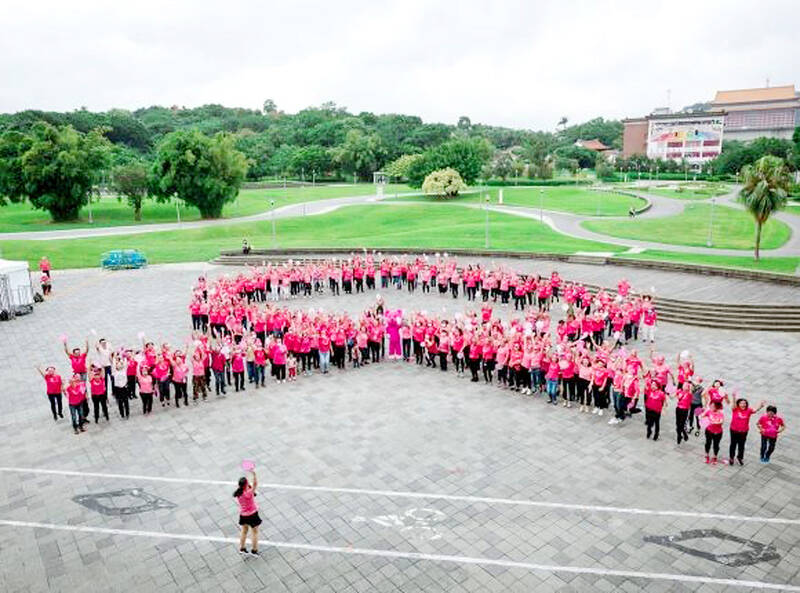A survey released by the Taiwan Breast Cancer Foundation and Yilan’s Lotung Pohai Hospital yesterday showed that more than 60 percent of people with breast cancer feel intense fear of relapsing after treatment, only slightly less than the fear they felt when they were first diagnosed.
It surveyed breast cancer patients’ mental stress levels throughout the treatment process, between late February and March, collecting 2,450 valid responses.
Of the respondents, 74.5 percent had completed treatment and were undergoing follow-up care, 18 percent were undergoing treatment and 7.5 percent were receiving treatment due to metastasis or relapse.

Photo courtesy of the Taiwan Breast Cancer Alliance
Hospital deputy superintendent Yeh Hsien-tang (葉顯堂) yesterday said 63.1 percent of the respondents had long-term emotional distress or stress issues before their breast cancer diagnosis, 69.5 percent were extremely shocked and terrified when they were first diagnosed and 57.5 percent felt they had lost control or were helpless.
While most of the respondents are people who have completed treatment, up to 60.1 percent said they feel intense fear of a relapse, he said.
During treatment, 48.6 percent of respondents felt that changes in appearance, such as hair loss, mastectomy or reconstructive surgery, had a negative impact on their self-confidence, Yeh said.
Also during treatment, 44.4 percent felt anxious or depressed due to side effects of therapy — implying that drugs still have room for improvement, he said, adding that 38 percent of respondents felt anxious due to the economic burden of needing long-term treatment and follow-up care.
Past surveys showed that many patients had to get a loan to pay for cancer treatment, Yeh added.
The survey also found that patients’ emotional support mainly came from family, friends and their medical team.
The findings suggest that improving mental support and societal and economic assistance are needed to help breast cancer patients, Yeh said, adding that medical teams must also enhance their doctor-patient communication efficacy, establish mutual-aid communities and pay attention to the special needs of certain groups.
Foundation chairperson Chang King-jian (張金堅) said there are “acute stress” and “chronic stress,” the latter of which is accumulated stress from daily life or work.
If it is not resolved, it might negatively impact a person’s mental and physical well-being, affect their immune system and cause cancer or increase cancer aggressiveness or metastasis, he said.
Taking medication as prescribed or doing activities that reduce stress can lower the risk of developing cancer caused by chronic stress, he said.

“China is preparing to invade Taiwan,” Deputy Minister of Foreign Affairs Francois Wu (吳志中) said in an exclusive interview with British media channel Sky News for a special report titled, “Is Taiwan ready for a Chinese invasion?” the Ministry of Foreign Affairs said today in a statement. The 25-minute-long special report by Helen Ann-Smith released yesterday saw Sky News travel to Penghu, Taoyuan and Taipei to discuss the possibility of a Chinese invasion and how Taiwan is preparing for an attack. The film observed emergency response drills, interviewed baseball fans at the Taipei Dome on their views of US President

ECONOMIC BENEFITS: The imports from Belize would replace those from Honduras, whose shrimp exports have dropped 67 percent since cutting ties in 2023 Maintaining ties with Taiwan has economic benefits, Ministry of Foreign Affairs officials said yesterday, citing the approval of frozen whiteleg shrimp imports from Belize by the Food and Drug Administration (FDA) as an example. The FDA on Wednesday approved the tariff-free imports from Belize after the whiteleg shrimp passed the Systematic Inspection of Imported Food, which would continue to boost mutual trade, the ministry said. Taiwan’s annual consumption of whiteleg shrimps stands at 30,000 tonnes, far exceeding domestic production, the ministry said. Taiwan used to fill the gap by importing shrimps from Honduras, but purchases slumped after Tegucigalpa severed diplomatic ties with Taiwan

The Executive Yuan yesterday approved a southwestern extension of the Sanying MRT Line from New Taipei to Bade District (八德) in Taoyuan, with a goal of starting construction by late 2026. The 4.03-kilometer extension, featuring three new stations, will run from the current terminus at Yingtao Fude Station (LB12) in New Taipei City to Dannan Station (LB14), where it will connect with Taoyuan’s Green Line, New Taipei City Metro Corp said in a statement. This extension will follow the completion of core Sanying Line, a 14.29-kilometer medium-capacity system linking Tucheng (土城), Sansia (三峽)

CARGO LOSS: About 50 containers at the stern of the ‘Ever Lunar’ cargo ship went overboard, prompting the temporary closure of the port and disrupting operations Evergreen Marine Corp, Taiwan’s largest container shipper, yesterday said that all crew members aboard the Ever Lunar (長月) were safe after dozens of containers fell overboard off the coast of Peru the previous day. The incident occurred at 9:40am on Friday as the Ever Lunar was anchored and waiting to enter the Port of Callao when it suddenly experienced severe rolling, Evergreen said in a statement. The rolling, which caused the containers to fall, might have been caused by factors including a tsunami triggered by an earthquake in Russia, poor winter sea conditions in South America or a sudden influx of waves,